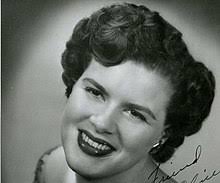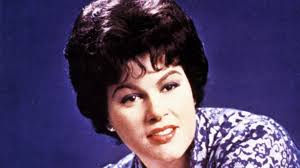Women in Country Music
- Shea Sutton

- Sep 28, 2020
- 7 min read
Updated: Oct 4, 2020
Patsy Cline.
Loretta Lynn.
Dolly Parton.

Three of the most successful female country music artists and arguably the most famous artists in the history of country music
Other than their extreme success and millions of records sold, they have something else in common: their complex and unquestionably “country” upbringings. Knowing how each of these women grew up and what they endured made their music unquestionably authentic and rooted in sadness, systematic oppression, and the South.
Patsy Cline

Virginia Patterson Hensley was born in Winchester, Virginia, on September 8, 1932, to a sixteen year old mother and forty-one year old father. Her father, Samuel, worked as a blacksmith, moving several times all over the state of Virginia to allow her father to find work. At the age of 8, Cline began playing the piano. In 1945, at only the age of thirteen, Cline had to be hospitalized due to a throat infection and rheumatic fever. According to Cline later, she stated that her heart even stopped beating. While recovering from the infection, she discovered that her voice had changed. She began performing at the local Baptist church, and developed her piano playing skills. At age 14, Cline auditioned at a local radio station for a disc jockey, Joltin’ Jim McCoy. She sang on the air live for her audition, and McCoy was impressed by her confidence. However, as her love for performing and singing began to build, her parents’ relationship at home began to deteriorate. By 1947, when Cline was fifteen, her father left the family, leaving her mother to find work as a seamstress to support her three children. However, the money was not sufficient and Cline was forced to drop out of high school at the age of sixteen and look for work. In addition to performing on the radio, entering numerous singing contests, and developing a cabaret nightclub act, Cline took work wherever she could find it, including a soda shop and a poultry factory where she had to pluck and cut the chickens.
Later in her life, Cline reported that her father had sexually abused her while growing up. She confided this to her close friend, Loretta Lynn, and told her to “take this to your grave”. Following Patsy’s passing, her mother gave details of the abuse to the creator of the 1985 biopic Sweet Dreams, detailing Patsy’s life.
Loretta Lynn

Born the second of eight children in Butcher Holler, Kentucky, Loretta Lynn grew up in a tiny cabin in the mountains. Her father was a coal miner, and her large family had little to no money. According to Lynn, it would be so cold in the winter that her mother glued different pages from the Sears catalogs to the walls of the cabin in order to keep the cold out. Lynn stated that her mother called the Sears catalogs their “wallpaper” and claimed that she made the small cabin beautiful. At only the age of thirteen, Lynn married her husband, Oliver “Dolittle” Lynn, who was six years her senior. At fourteen, Loretta Lynn had her first child. By 21, she had four children, and was already a grandmother by the age of 29. She raised her children in a three room house with no indoor plumbing or running water, yet her husband was convinced that she would be the next great country singer. He bought her first guitar as a gift for her 26th birthday. She left her husband while pregnant with her first child due to his infidelity. She claimed that their relationship was incredibly violent with her once hitting him over the head with a cast iron pan, causing his teeth to fall out. She also claimed that his infidelity continued throughout her career on the road, and he would often drink so much that she claimed if it were not for her children, she would not have come home. This tumultuous relationship with her husband is depicted in her songs.
Dolly Parton

In a tiny one-room cabin in Pittman Center, Tennessee, Dolly Parton was born on January 19, 1946. The fourth of twelve children, Dolly Parton was raised in extreme poverty. Her father worked in the mountains in Tennessee and worked odd jobs, like construction, to make ends meet. Her father was illiterate, but Dolly Parton states that he was actually one of the smartest people she knew, especially when it came to business. As a young child, Dolly’s family moved to a farm at Locust Ridge, where she and her twelve siblings were raised in a one room cabin. Her family was incredibly impoverished, and as Dolly Parton has described, “dirt poor”. She even claimed that her father paid the doctor that delivered her with a bag of cornmeal.

By the age of six, Dolly began performing at church, and she began playing a homemade guitar. When she was eight, her uncle bought her first actual guitar. As a child, she began performing on a variety of local programs in East Tennessee, and by age thirteen, she began recording as part of a small record label. She then appeared at the Grand Ole Opry, and her career continued from there.
Below is a tribute performed by Carrie Underwood for a variety of female country music artists in honor of the 95th anniversary of the Grand Ole Opry. She pays tribute to Patsy Cline with a rendition of "Crazy" at 26 seconds. She pays tribute to Loretta Lynn with a rendition "You Ain't Woman Enough" at 1:32 seconds. She then pays tribute to Dolly Parton at 3:35 seconds.
The Truth in Their Music
Each of these different histories of growing up affected the music of each of these women. For the first time, in many cases, women throughout the South were hearing songs by people that grew up like them. Women that were married at 16 and had three children by 20 finally had people that they could relate to and had songs that they could listen to that told the stories of their lives. Women, like Patsy, Loretta, and Dolly, that grew up incredibly poor or way out in the country finally had representation. For the first time, they weren’t hearing songs from men about relationships. They were finally hearing songs from a woman’s point of view, and these women were not like many other country singers during this time. They were not raised and living in some big city, but singing about country music. These women were raised in the pits of the South, overcoming severe poverty and lack of resources.
Aside from the poverty that they had to overcome, these were also WOMEN in the 1950s, 1960s, 1970s, and 1980s, competing in a man’s world. They had to work twice or three times as hard as any man to simply get their foot in the door. These women had to fight to reach their status. The combination of oppression as women and extreme poverty in the deep South, it is fascinating that these women were able to tell their stories and be recognized on country radio throughout the nation.

One of Patsy Cline’s most emotive songs was Sweet Dreams. What was incredibly shocking about this song was not simply the lyrics, but was the combination of when she performed it and what was said. The song itself is a beautiful rendition about a woman who should be hating her man, who constantly disrespects her and does not love her, but the woman in the song is having “sweet dreams” of her man instead of hating him like she knows she should. The song itself could be an amazing anthem for women during this time period that it was released (1963). Finally, women could turn on the radio and hear a song that related to what she was feeling and going through. What is further emotional from this song is when Patsy Cline performed it. At her concert in 1963, she performed this song with her band for the first time. That night, she died in a plane crash.

Possibly the most provocative female country singer, Loretta Lynn did not hold back when writing her songs. As stated before, Loretta Lynn and her husband had an incredibly difficult relationship. She wrote about their marriage in several of her songs. Don’t Come Home a Drinkin’ in 1967 was in reference to her husband’s excessive drinking and violence. Another of her songs, and most likely the most controversial, is “The Pill”, where Loretta Lynn sings about birth control. Not only does she sing about the pill, but she praises it and explains the freedom that the pill gives married women. The lyrics are witty, clever, and provocative, but they also show the sad reality of many women during this time. Some of the lyrics include, “All I’ve seen of this old world is a bed and a doctor bill” and “Oh but daddy don’t you worry none, cause mama’s got the pill”. Loretta Lynn had four children by the age of 21 and six children total. According to her, the song was inspired because after the birth control pill came out, she looked back on the beginning of her marriage, and wished that she would have had something like that to prevent becoming pregnant almost every year. “The Pill” was banned by sixty different country radio stations and was incredibly controversial. According to Loretta Lynn, she has had fourteen songs banned from country radio.

One of Dolly Parton’s most famous songs, Jolene, has become one of the most famous country music songs in general. In the song, Dolly sings about a beautiful woman named Jolene with raven hair and emerald green eyes. She begs this woman not to steal her man, even though she can. This song was one of the first instances in country music of cheating being described from the women’s perspective. Many women during this time could relate to this song, and it was one of the first times that women had someone like them singing about being cheated on. It was so important for the women to be represented, and many of Dolly Parton’s songs did this. Instead of hearing about men cheating from the men, Dolly Parton was now singing about these situations from the perspective of the woman, so her songs became anthems for women that were under-appreciated or not represented.
Song Analysis
These women truly changed how women were portrayed and represented in country music. For the first time, women in the South were able to relate to women on the radio. These three women changed country music and paved the way for the current female country music artists.
SOURCES:
A&E Networks Television. (2020, June 11). Dolly Parton. Biography.com. https://www.biography.com/musician/dolly-parton.
A&E Networks Television. (2020, March 6). Patsy Cline. Biography.com. https://www.biography.com/musician/patsy-cline.
A&E Television Networks. (2009, November 16). Loretta Lynn is born. History.com. https://www.history.com/this-day-in-history/loretta-lynn-is-born.
Carter, M. (2020, September 20). Loretta Lynn Was Married at Such a Young Age. Country Living. https://www.countryliving.com/life/entertainment/g3088/things-you-didnt-know-about-loretta-lynn/.
Celebrating Seniors - Dolly Parton Turns 70 pt 1of2. Celebrating Seniors – Dolly Parton Turns 70 Pt 1of2. https://web.archive.org/web/20160302143611/https://seniorcitylocal.com/celebrating-seniors-dolly-parton-turns-70-pt-1of2/.
Dolly, T. (2020, October 2). Welcome to the official, historical archive of Dolly Parton. Dolly Parton. https://dollyparton.com/about-dolly-parton.
Kettler, S. (2019, December 4). Why Loretta Lynn Stood by Her Husband Despite His Cheating and Violent Behavior. Biography.com. https://www.biography.com/news/loretta-lynn-doo-marriage-cheating-violence.
Liptak, C. (2019, June 3). Loretta Lynn's 'The Pill' May Have Gotten Banned, But She Had the Last Laugh. The Boot. https://theboot.com/loretta-lynn-the-pill-secret-history-of-country-music/.
Prince, J.-lee. (2019, September 11). The Life of Patsy Cline from Her Childhood Illess to Becoming a Country Legend. https://news.amomama.com/170964-the-life-patsy-cline-her-childhood-illes.html.
Wbur. (2010, November 10). Loretta Lynn's Full Life. Loretta Lynn's Full Life | WBUR News. https://www.wbur.org/npr/131097120/loretta-lynn-after-strife-a-full-life.









Comments